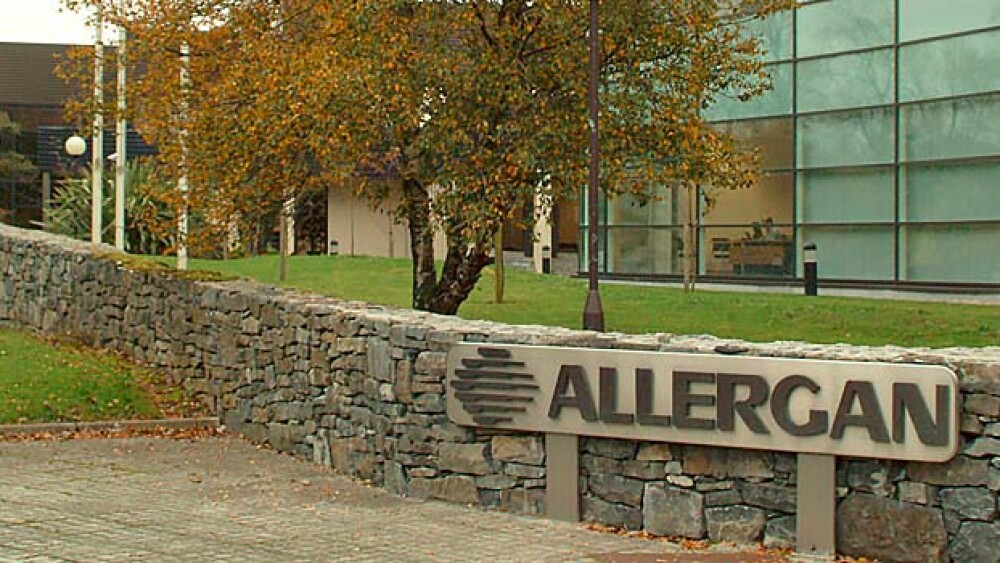Allergan is a good example of how many mergers and acquisitions over a very short period of time created a large, international company.
Dublin-based Allergan is a good example of how many mergers and acquisitions over a very short period of time created a large, international company. So, it’s a little ironic that now that the company is so large, investors and analysts are starting to speculate on a breakup of the company.
Aaron Gal, an analyst with Bernstein, recently met with Brent Saunders, Allergan’s chief executive officer. Their meeting covered a lot of ground, focused partially on Monday’s federal court ruling that invalidated some of the company’s patents for its dry-eye drug Restasis. But along the way, Gal asked Allergan about what he thought about breaking up the company.
The drug patent decision was an interesting one. Broadly, there are two things at issue. First, Allergan sold the Orange Book-listed patents for Restasis to the Saint Regis Mohawk Tribe, which officially closed in September 2017. The tribe then granted Allergan exclusive licenses to the patents. The tribe’s “sovereign immunity” would protect the patents from any patent challenge. Or, as the Los Angeles Times wrote yesterday, “In the annals of cynical corporate subterfuges, it would be hard to top the effort by the drugmaker Allergan to fend off a patent challenge by selling its drug rights to a rural New York Indian tribe.”
Texas federal Judge William Bryson apparently agreed, saying, “Sovereign immunity should not be treated as a monetizable commodity that can be purchased by private entities … to evade their legal responsibilities.” He went on to say, “The Court has serious concerns about the legitimacy of the tactic that Allergan and the Tribe have employed.”
Allergan paid the tribe $13.75 million up front and planned to pay $15 million each year in royalties. Bryson noted that, once you got past Allergan and the tribe’s rationalizations for how it was designed to benefit the tribe and strengthen the Restasis intellectual property, that the company wanted “the right to continue to enjoy the considerable benefits of the U.S. patent system without accepting the limits that Congress has placed on those benefits.”
The first issue is a bit of a technicality, because Bryson didn’t actually rule on it. The second issue is that he ruled Allergan’s patents on Restasis are invalid. The tribal relationship is a separate proceeding. Bryson commented on it, but didn’t rule on it. The Los Angeles Times writes, “That could function as a guidepost for the U.S. Patent Office, which will have to rule on the transaction’s validity. Legal authorities say Bryson’s opinion should be taken as a red light by other companies thinking about using the same maneuver.”
Bryson invalidated four key patents for Restasis, but the company plans to appeal, and the U.S. Food and Drug Administration (FDA) hasn’t approved any copycats of the drug yet. Restasis brought in about $1.5 billion last year.
Which circles back to Gal’s conversation with Saunders. Is Saunders planning to break up Allergan? The short answer is no. The more complicated answer is maybe. Saunders noted that the company recently divested a big chunk of its generic drug portfolio to Teva Pharmaceutical Industries, and Saunders said he “likes to see if it works” in the company’s current structure. It’s entirely possible that the question about breaking up Allergan is related to Teva. Allergan has a 9.9 percent stake in the company and the stock is faltering, having lost value from about $5.3 billion to about $3.2 billion.
Saunders also noted that “If one side [of the business] does not work and the other is a rock star, then it goes on the table.”
Gal wrote in a note to investors, “The comment here needs to be a bit cautious. To be clear upfront, when asked, CEO Saunders noted that this is a ‘premature discussion’ and it is his job to ‘think of everything,’ so him willing to comment does not suggest they are taking active steps in this direction. That said, his comments suggested to us some level of maturation around the thinking of this option and make us (not AGN), think that if 2018 does not go well, splitting the company will become a real option.”





